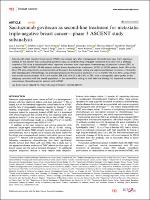| dc.contributor | Vall d'Hebron Barcelona Hospital Campus |
| dc.contributor.author | Carey, Lisa |
| dc.contributor.author | Loirat, Delphine |
| dc.contributor.author | Punie, Kevin |
| dc.contributor.author | Dieras, Veronique |
| dc.contributor.author | Dalenc, Florence |
| dc.contributor.author | Cortés Castan, Javier |
| dc.contributor.author | Bardia, Aditya |
| dc.date.accessioned | 2022-09-09T07:45:33Z |
| dc.date.available | 2022-09-09T07:45:33Z |
| dc.date.issued | 2022-06-09 |
| dc.identifier.citation | Carey LA, Loirat D, Punie K, Bardia A, Diéras V, Dalenc F, et al. Sacituzumab govitecan as second-line treatment for metastatic triple-negative breast cancer—phase 3 ASCENT study subanalysis. NPJ Breast Cancer. 2022 Jun 9;8:72. |
| dc.identifier.issn | 2374-4677 |
| dc.identifier.uri | https://hdl.handle.net/11351/8091 |
| dc.description | Breast cancer; Second-line treatment |
| dc.description.abstract | Patients with triple-negative breast cancer (TNBC) who relapse early after (neo)adjuvant chemotherapy have more aggressive disease. In the ASCENT trial, sacituzumab govitecan (SG), an antibody-drug conjugate composed of an anti-Trop–2 antibody coupled to SN-38 via a hydrolyzable linker, improved outcomes over single-agent chemotherapy of physician’s choice (TPC) in metastatic TNBC (mTNBC). Of 468 patients without known baseline brain metastases, 33/235 vs 32/233 patients (both 14%) in the SG vs TPC arms, respectively, received one line of therapy in the metastatic setting and experienced disease recurrence ≤12 months after (neo)adjuvant chemotherapy. SG prolonged progression-free survival (median 5.7 vs 1.5 months [HR, 0.41; 95% CI, 0.22–0.76]) and overall survival (median 10.9 vs 4.9 months [HR, 0.51; 95% CI, 0.28–0.91]) vs TPC, with a manageable safety profile in this subgroup consistent with the overall population. In this second-line setting, as with later-line therapy, SG improved survival over conventional chemotherapy for patients with mTNBC. |
| dc.language.iso | eng |
| dc.publisher | Nature Research |
| dc.relation.ispartofseries | NPJ Breast Cancer;8 |
| dc.rights | Attribution 4.0 International |
| dc.rights.uri | http://creativecommons.org/licenses/by/4.0/ |
| dc.source | Scientia |
| dc.subject | Mama - Càncer - Tractament |
| dc.subject | Anticossos monoclonals - Ús terapèutic |
| dc.subject.mesh | Triple Negative Breast Neoplasms |
| dc.subject.mesh | /drug therapy |
| dc.subject.mesh | Immunoconjugates |
| dc.title | Sacituzumab govitecan as second-line treatment for metastatic triple-negative breast cancer—phase 3 ASCENT study subanalysis |
| dc.type | info:eu-repo/semantics/article |
| dc.identifier.doi | 10.1038/s41523-022-00439-5 |
| dc.subject.decs | neoplasias de mama triple negativos |
| dc.subject.decs | /farmacoterapia |
| dc.subject.decs | inmunoconjugados |
| dc.relation.publishversion | https://doi.org/10.1038/s41523-022-00439-5 |
| dc.type.version | info:eu-repo/semantics/publishedVersion |
| dc.audience | Professionals |
| dc.contributor.organismes | Institut Català de la Salut |
| dc.contributor.authoraffiliation | [Carey LA] University of North Carolina Lineberger Comprehensive Cancer Center, Chapel Hill, NC, USA. [Loirat D] Medical Oncology Department and D3i, Institut Curie, Paris, France. [Punie K] Department of General Medical Oncology and Multidisciplinary Breast Centre, Leuven Cancer Institute, University Hospitals Leuven, Leuven, Belgium. [Bardia A] Department of Hematology/Oncology, Massachusetts General Hospital Cancer Center, Harvard Medical School, Boston, MA, USA. [Diéras V] Department of Medical Oncology, Centre Eugène Marquis, Rennes, France. [Dalenc F] Institut Claudius Regaud, IUCT-Oncopole, Toulouse, France. [Cortés J] International Breast Cancer Center, Quirón Group, Barcelona, Universidad Europea de Madrid, Faculty of Biomedical and Health Sciences, Department of Medicine, Madrid. Vall d´Hebron Institute of Oncology (VHIO), Barcelona, Spain |
| dc.identifier.pmid | 35680967 |
| dc.identifier.wos | 000809031400001 |
| dc.rights.accessrights | info:eu-repo/semantics/openAccess |

